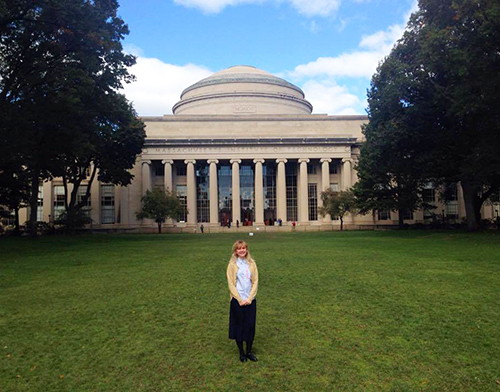Grad Life: MIT Helped Me Tackle My Technophobia—and Push Disciplinary Boundaries
-
-
slice.mit.edu
Filed Under
 Massachusetts Institute of Technology: world renowned for its research in fields including engineering, computer science and … humanities? Technology being the operative word in the name, and often the operative artifact in its fame, for some the fact MIT even offers humanities degrees comes as a surprise.
Massachusetts Institute of Technology: world renowned for its research in fields including engineering, computer science and … humanities? Technology being the operative word in the name, and often the operative artifact in its fame, for some the fact MIT even offers humanities degrees comes as a surprise.I was one of those people. Self-confessed technophobe and analog extraordinaire, MIT seemed worlds apart from my undergraduate study in an institution that was over 565 years old (and in a castle). I was used to first editions of Shakespeare, not first glimpses at Oculus.
But the MIT Center for Civic Media was asking and answering the kind of questions that had been plaguing my thoughts as I became more involved and invested in climate change activism. In the age of online petitions and social media metrics, how can social movements be effective? How can we build civic media and collective spaces that invest in progressive change? Where do my skills fit into making this change happen? A two-year master's degree in Comparative Media Studies would allow me to start articulating answers to these questions and face my wariness of technology. I’d even learn to code—right?
Arriving at MIT, the Media Lab seemed more like something from a science-fiction novel than a set of workspaces. Floor-to-ceiling glass windows invite the passerby to try and fathom what they can from tangled wires and flashing light boards, futuristic robotic instruments, and now even a water fountain that provides flavored still or sparkling water on request.*
It’s pretty overwhelming, especially when you’re still running Windows 7 on a five-year-old laptop and struggle with adding extensions to Chrome. My department required a workshop in the first semester that exercised and built our skills across various mediums and platforms. Although at points it felt like being thrown in at the deep end, it did mean that I quickly learnt to swim.
My “swimming” looked a bit different from how I had initially imagined, and sometimes to the outside eye it may have seemed a lot like drowning. Even now my technical skills are pretty minimal—I only managed to get to the third class of MIT’s EdX Python course I’d promise myself to complete. But despite the fact I may not be a comprehensive programmer, I’m no longer afraid to ask questions.
MIT taught me that facing your fears is important. Instead of glazing over and assuming I won’t understand when colleagues and classmates start talking technical, I ask how or what or why until I understand. I try, and a lot of the time I get things wrong, but I keep trying. I taught myself how to edit video in Adobe Premier Pro. My classmates taught me about virtual reality, 360 video, social media, big data, algorithms, and video games.
When I did my Priscilla King Gray Fellowship and MISTI Internship this summer, I utilized some of my technical learning in collaborative remote work and communications strategies. My new knowledge of online platforms helped me work with UK-based climate change group The Surefoot Effect even at a distance, whilst insights into analytics, algorithms, and audiences on social media shaped my outreach work at the UNFCCC.
So my fear of crossing disciplinary boundaries was worth pushing. I’ve learned more about technology than I thought I ever would, in spaces well beyond the classroom. Perhaps most importantly I’ve learned that no matter where you are, the people around you have a whole encyclopedia of knowledge on their favorite things—and sometimes the best learning comes from the most unexpected places.
*BEVI Co-Founder Sean Grundy is a Sloan School alumnus!
Grad Life blog posts offer insights from current MIT graduate students on Slice of MIT.







